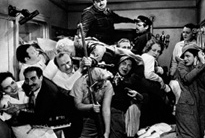5/6/2004
 Warner, five discs, B&W, NR, 615 min. plus supplements, mono, fullscreen, Street: May 4, $59.92; First Run: W, 1935-1946, NA
Warner, five discs, B&W, NR, 615 min. plus supplements, mono, fullscreen, Street: May 4, $59.92; First Run: W, 1935-1946, NA
The first five classic Marx Brothers movies may dwell in DVD limbo (along with the best of W.C. Fields and Mae West), but this overstuffed box set contains the rest of their work as an active three-man team. The problem, as is plainly stated here on an audio commentary by Marx historian Glenn Mitchell, is that the seven films contained here feature the “domesticated” Marxes, whose anarchic impulses are loosed in only a handful of memorably brilliant sequences. A Night at the Opera (1935) is the only unmitigated gem, although some of the titles (1940’s Go West, 1946’s A Night in Casablanca) are better than their meager reputations. The box contains dozens of extras, but most are simply vintage short subjects taken from the Turner library – of these, two Robert Benchley offerings jibe the best with the Marx sense of humor. The original supplements include fact-filled audio commentaries by a characteristically enthusiastic Leonard Maltin (A Night at the Opera) and the deadpan but amusing Mitchell (1937’s A Day at the Races). A bit more lively are two 30-minute featurettes produced by Taylor Made Entertainment’s John Rust and Karen Hillhouse about Opera and Races that are composed of comments from such Marx students as Curb Your Enthusiasm director Robert Wiede, veteran comedy writers including Carl Reiner and Marx leading ladies Kitty Carlisle and Maureen O’Sullivan. The featurettes provide a crash course in Marx-ism, with the talking heads doting on the most important fact in the success of Opera and Races –wunderkind producer Irving Thalberg’s decision to have the Brothers hone the films’ comic set pieces on the road in a traveling vaudeville stage show. (The finest moments in the box are precisely these routines, classics like the stateroom sequence in Opera and Chico’s “Tootsie-Frootsie ice cream” scam in Races.) The most welcome bonus, however, is an all-too-brief segment from a 1961 “Hy Gardner Show” in which Groucho recounts the method used by the Marxes to show their displeasure at Thalberg’s tendency to disappear during their business meetings: the trio invaded his office, stripped to the skin and began roasting baked potatoes in his fireplace. Listening to this story, it’s no wonder why these renegade vaudevillians were hailed as folk heroes by the 1960s counterculture. —Ed Grant